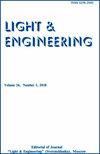Daylighting Dynamic Control by Smart Window with Grating Optical Filter
IF 0.3
4区 工程技术
Q4 ENGINEERING, ELECTRICAL & ELECTRONIC
引用次数: 0
Abstract
A smart window with a novel grating optical filter is proposed, which supplies dynamic daily and annual control of window transmission without the use of blinds and similar devices. The filter attenuates direct solar radiation, letting in diffused and reflected radiation, thus creating more comfortable conditions for daylighting, insolation, and sun protection in rooms. A method for calculating the grating filter is changed and numerical modelling is conducted to show the capabilities of the new method of dynamic control of transmission. The optimal geometric parameters of the filter for a single-glazed smart window at a given azimuth of the window orientation are determined. The hourly values of the light transmittance of the filter during daylighting hours are calculated for the 15th day of each month from April to September, and the theoretical angular characteristics of the transmission of the filter, corrected for reflection and absorption, are constructed. The average monthly values of the theoretical and corrected light transmittance of a smart window are obtained, based on the results of calculations every hour compared to the time of day when the azimuths of the Sun and the window are equal. It is shown that the smart window with the built-in grating optical filter provides the minimum transmission at a given time of the day, taking into account the azimuth of the window, the geographic coordinates of the building, the seasonal and daily distribution of the solar radiation intensity on the calculated day of the year, and in the rest of the time, with the most demanded protection from solar radiation, the filter functions within acceptable limits. It is stated that the smart window with the built-in optical filter is most suitable for rooms with a long stay of people during daylight hours that is for office, educational, industrial, etc. rooms, in order to provide comfortable daylighting and the required insolation and thermal conditions during working hours.光栅滤光片智能窗采光动态控制
提出了一种新型光栅滤光片的智能窗,在不使用百叶窗和类似装置的情况下,实现了窗的每日和年度动态传输控制。滤光片可以减弱太阳的直接辐射,让漫射和反射的辐射进入室内,从而为室内的采光、日照和防晒创造更舒适的条件。改变了光栅滤波器的计算方法,并进行了数值模拟,以显示新方法动态控制传输的能力。确定了在给定窗向方位角下单玻璃智能窗滤波器的最优几何参数。从4月到9月,每月15日计算滤光片在日照时段的逐时透光率,并构造滤光片经反射和吸收校正后的透光率的理论角特性。根据每小时与太阳方位角与窗口方位角相等时的计算结果,得到了智能窗口的理论透光率和修正透光率的月平均值。结果表明,内置光栅滤光片的智能窗在考虑窗的方位角、建筑物的地理坐标、一年中计算日太阳辐射强度的季节和日分布的情况下,在一天中给定的时间内提供最小的透射率,而在其他时间,在最需要太阳辐射保护的情况下,滤光片的功能在可接受的范围内。指出,内置滤光片的智能窗最适合于白天人员停留时间较长的房间,即办公、教育、工业等房间,以便在工作时间提供舒适的采光和所需的日照和热条件。
本文章由计算机程序翻译,如有差异,请以英文原文为准。
求助全文
约1分钟内获得全文
求助全文
来源期刊

Light & Engineering
ENGINEERING, ELECTRICAL & ELECTRONIC-OPTICS
CiteScore
1.00
自引率
50.00%
发文量
0
审稿时长
1 months
期刊介绍:
Our magazine
develops comprehensive communication within the lighting community, providing opportunities for discussion and free expression of opinions of specialists of different profiles;
contributes to the convergence of science and engineering practice, the search for opportunities for the application of research results in lighting and technological applications of light;
keeps the scientific community up to date with the latest advances in the theory of the light field, providing readers with operational professional information;
initiates international cooperation, promotes and distributes the results of Russian authors in the international professional community;
provides equal opportunities for authors from different regions of Russia and other countries.
The journal publishes articles in the following areas:
visual and non-visual effects of radiation on humans;
light field theory;
photometry and colorimetry;
sources of light;
ballasts;
light devices, their design and production technology;
lighting and irradiation installation;
light signaling;
methods of mathematical modeling of light devices and installations;
problems of energy saving in lighting, installation and operation of lighting installations;
modern production technologies of lighting products for lighting control systems;
innovative design solutions;
innovations in lighting and lighting design;
the study of the effect on plants and animals, problems of using light in medicine;
problems of disinfection of premises, water and smell elimination with the help of technology of UV radiation using;
problems of light in the ocean and space.
 求助内容:
求助内容: 应助结果提醒方式:
应助结果提醒方式:


